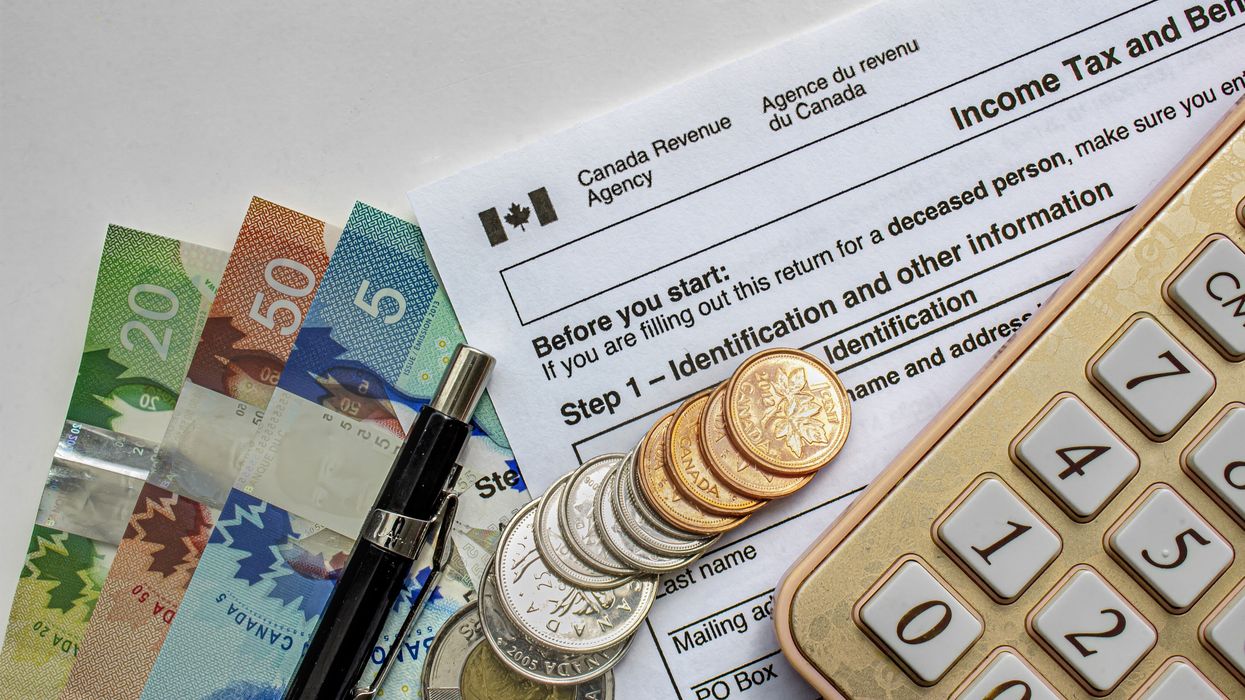Here's What You Need To Know About Canada's Tax Brackets When Filing Your Tax Return This Year
Tax season is almost here!

Canada Revenue Agency income tax return paper with Canadian money and a calculator
It's almost time to start doing your Canada taxes and you could end up owing money or getting a tax refund from the federal government.
So, you might be wondering what Canada's tax brackets and income tax rates mean for you when you file your tax return this year.
Since you'll be doing your taxes for the previous year when filing in 2024, you need to know the 2023 tax brackets and rates for income you earned during that year.
Each year, the Canada Revenue Agency adjusts these rates for inflation and a 6.3% indexation increase was put in place for 2023.
The federal tax brackets and rates for your 2023 income that will impact your taxes when you file your return this year are:
- 15% on the portion of taxable income that's $53,359 or less
- 20.5% on the portion of taxable income over $53,359 and up to $106,717
- 26% on the portion of taxable income over $106,717 and up to $165,430
- 29% on the portion of taxable income over $165,430 and up to $235,675
- 33% on the portion of taxable income over $235,675
If you earned $50,000 in 2023, all of that income is taxed at 15%.
That works out to about $7,500 in federal taxes.
If you earned $60,000 in 2023, the initial $53,359 portion of your income is taxed at 15%. Then, the remaining $6,641 of your income is taxed at 20.5%.
That works out to around $9,332 in federal taxes.
If you earned $100,000 in 2023, the initial $53,359 portion of your income is taxed at 15% while the remaining $46,641 is taxed at 20.5%.
That works out to $17,332 in federal taxes.
If you earned $120,000 in 2023, the initial $53,359 is taxed at 15% while $53,358 is taxed at 20.5% and $13,283 is taxed at 26%.
That works out to about $22,129 in federal taxes.
Depending on the benefits you received during the year, tax credits you claim on your return, if your employer deducts taxes from each paycheque and more, you could either owe money or get a tax refund from the government.
You can start filing your 2023 tax return online as of Monday, February 19, 2024.
For most Canadians, the deadline to file a tax return is Tuesday, April 30, 2024.
The deadline to pay your taxes is April 30 as well.
If you're already looking ahead to the 2024 tax return that you'll be filing next year, here are Canada's new tax brackets for 2024 that apply to income earned this year:
- 15% on the portion of taxable income that is $55,867 or less
- 20.5% on the portion of taxable income over $55,867 and up to $111,733
- 26% on the portion of taxable income over $111,733 and up to $173,205
- 29% on the portion of taxable income over $173,205 and up to $246,752
- 33% on the portion of taxable income over $246,752
This article's cover image was used for illustrative purposes only.
- Canada's New Tax Brackets For 2023 Are Out & This Is How Much You'll Be Forking Out ›
- Federal Benefits & Credits: What's Tax-Free & What You'll Have To Claim On Your Tax Return ›
- Canada's Tax Brackets For 2024 Are Out Now & This Is How Your Taxes Will Be Impacted ›
- 9 Canadian Tax Credits You Could Claim When Filing This Year That You Might Not Know About - Narcity ›
- Claiming Home Office Expenses On Your Taxes Has Been Changed & Here's What You Need To Know - Narcity ›
- Canada Taxes: Here's What You Need To Know About Filing Your 2023 Tax Return This Year ›